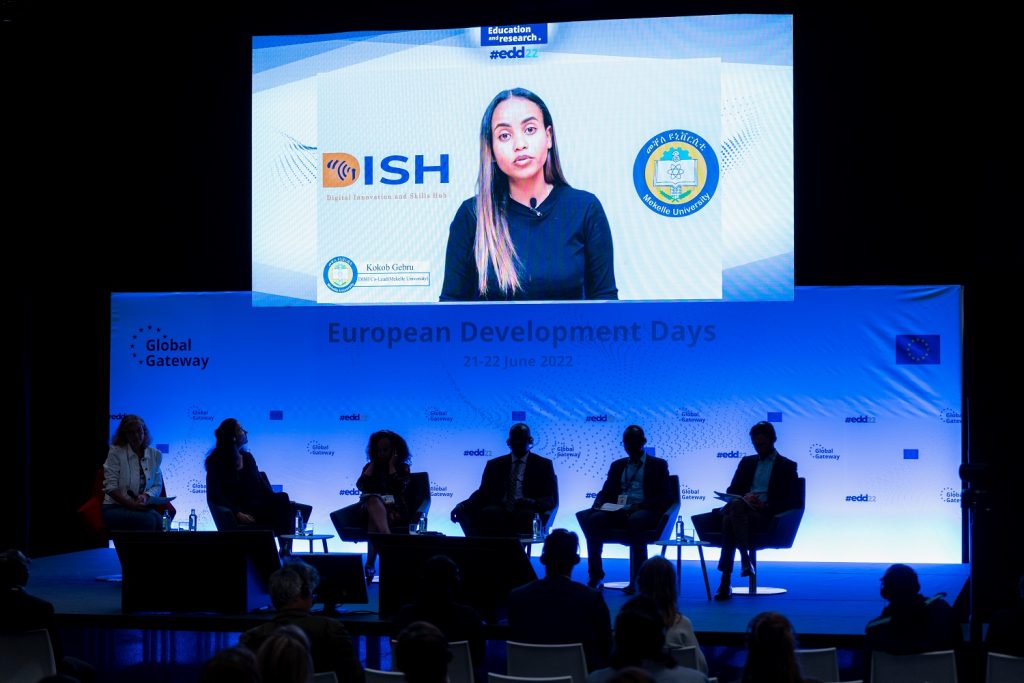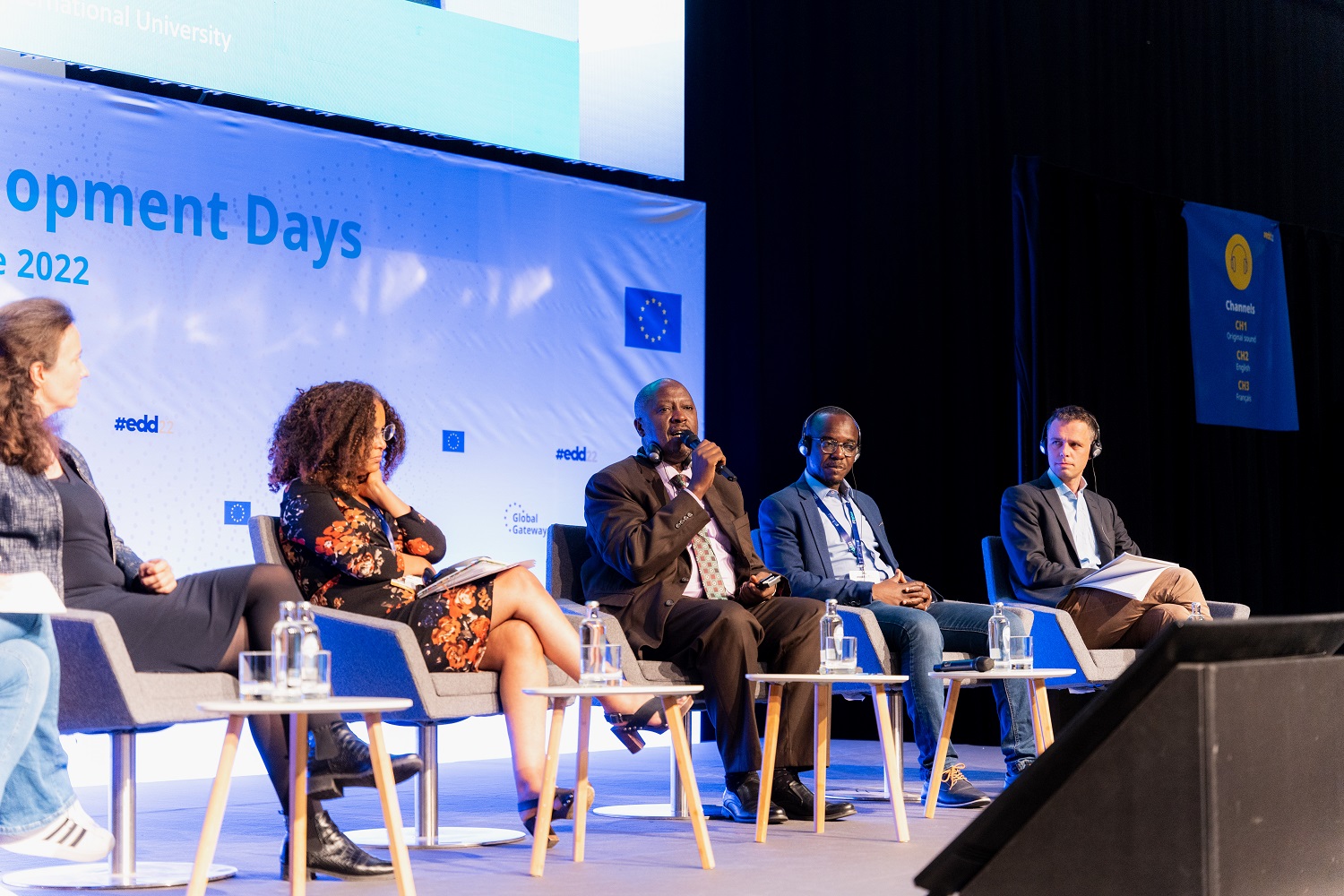How can education access be given to youths and vulnerable women in conflict areas to enable them to build resilience and develop competence in times of crisis? These and many more were part of the issues highlighted during the European Development Days (EDD22) Session on E-learning Online & Offline for Vulnerable Communities.
Kobob Gebru from Mekelle University, Tigray Northern Ethiopia puts it this way “What if you are under a total communication blackout and you don’t have access to the internet or any means of communication? What about if you have been living under a total siege for more than a year and you cannot access banking services and no means of transportation or electricity and no cash to buy basic educational materials like paper, pencil, and books?”

All over the world, conflict areas and vulnerable communities are characterized by a lack of access – communication, health, education, peace, and transportation.
East Africa based Digital Innovation and Skills Hub (DISH) is an e-learning platform developed to provide access to youth and women to develop employment skills. The DISH project which has partners in Somalia, Sudan, Ethiopia, Uganda, and South Sudan targets vulnerable groups who have been denied rights to education and those who have difficulty accessing it.
The DISH courses bridge that gap by focusing on low-threshold e-learning courses, which can be used in online and offline digital learning on a variety of devices and settings. One essential aspect of DISH is that the courses were contextualized to reflect the realities of the learners.
“The contents were developed and contextualized to fit in the circumstances of the different beneficiaries in Ethiopia, Sudan, South Sudan, and Somalia”, Prof Mouhamad Mpezamihigo, Vice-Chancellor, Kampala International University
The courses are – Peace Building and Conflict Resolution Diplomacy, Peace Communication, ICT and Media, Legal Justice System, Community and Customary Law, Business administration, Computer Science, Community Mental Health, Community Health, and Primary School Teaching
Education in Times of Crises: How DISH is Building Resilience and Hope in Tigray, Northern Ethiopia
In conflict areas like Tigray Region, Northern Ethiopia. DISH is currently using digital technology to provide education access to youths and women to develop employment skills in spite of the conflict. Since hostilities began in November 2020, millions of people have been displaced from the Tigray region. In times of war, access to education, health, and communication is always non-existent.
According to UNICEF “more than 2.2 million in northern Ethiopia who are acutely food insecure, including at least 140,000 in Tigray who are already facing famine-like conditions”
“Mobile health and nutrition teams have been attacked and harassed. Health facilities have been looted or damaged and essential vaccination capacity has ground to a halt. Many health workers have not returned to work. Destruction of water infrastructure has caused an extreme scarcity of safe drinking water”
To help the affected communities in Tigray, DISH set up a Learning Management System and mobile application that will enable students to access learning online and offline.
“The students are expected to meet the teachers at least once a week. Among the 4,400 students that were registered, 80% were women”
“The DISH project has given hope to so many young people that they can learn and educate themselves at their own pace and convenience even in times of crises when life seems full of darkness because of the ongoing genocidal war and total siege imposed on the people of Tigray” – Dr. Helen Tesfay.
The students are also trained to build mental and community resilience. This helps them to address issues such as violence, suicide and parenting problems.
“We developed a cross-cutting curricula that enables students to consider their traumatic experiences and have skills that will enable them to cope”, Dr. Selam Kidane, Course Lead, Community Mental Resilience, DISH
The Small Solutions that Make the Big Difference
“We always think about offering big solutions, sometimes it is the small solutions that work miracles. It is the small solutions that keep people going and afloat”, Mark Vlek de Coningh, Partnerships & Programme Developer at NUFFIC.
One of the salient impacts of the DISH project is the hope being given to these vulnerable communities. It shows them that there is something to aspire to during and after the conflict. After the training, students are expected to develop employable skills in office administration, communications, information technology, data stewardship, community health, and primary school teaching.
Currently, more students are enrolling in the Computer Science (CS) Courses. The CS courses give them the opportunity to develop basic hands-on skills in computer networking, IT support, IT project management, python programming, and FAIR Data Management. Prof. Francisca Oladipo, the Course Lead for CS Courses believes that one of the ways to reach the young people and ensure people in the Horn of Africa is to introduce them to Computing and ICT.
“I believe this project is very essential and it comes to addressing these issues because it can give a lot of people a future to think about”, Helen Tesfay.
DISH partnership
The DISH platform was established with 12 partners in Somalia, Sudan, South Sudan, Ethiopia, Uganda and the Netherlands to implement two projects funded under the Orange Knowledge Programme managed by Nuffic and funded by the Dutch Ministry of Foreign Affairs. The DISH range from Universities to civil society organisations. They include East Africa University and Eastern College in Somalia; the Sudanese Organisation for Research and Development (SORD) in Sudan; Community Empowerment for Progress Organisation (CEPO) in South Sudan; Mekelle University, Aksum University, Admas University, Addis Ababa University, and Adwa Pan-African University in Ethiopia; Kampala International University in Uganda; and the NGO Action Africa Help International. Tilburg University in the Netherlands assists the partnership.
The projects contribute to peace building, employment for vulnerable youth and women, and strengthening resilience. Through building capacity on e-learning and developing of 11 low-threshold skill-based courses, the projects will graduate around 13.000 youth/women in employable areas enhanced with digital innovation and increase the capacities of authorities to utilize new opportunities of digitalization and data sharing.
About the Orange Knowledge Programme
The projects are supported by the Orange Knowledge Programme, a Dutch global development programme, available in 54 developing countries and managed by Nuffic, a Dutch non-profit organisation for internationalisation in education. Launched in mid-2017, it aims to have provided tens of thousands with the possibility to change their future through education and training by mid-2022. The programme is supported by the Dutch Ministry of Foreign Affairs

